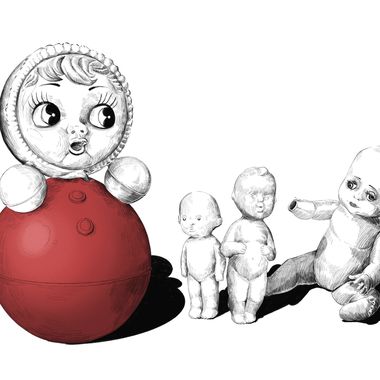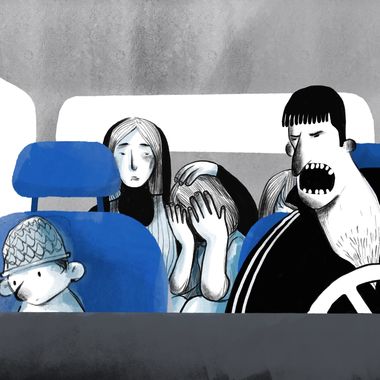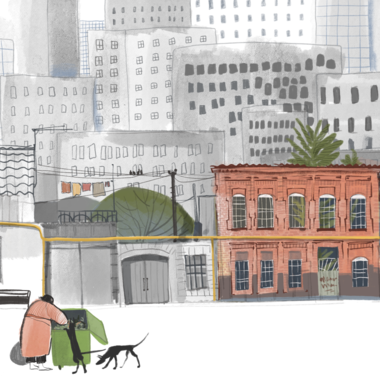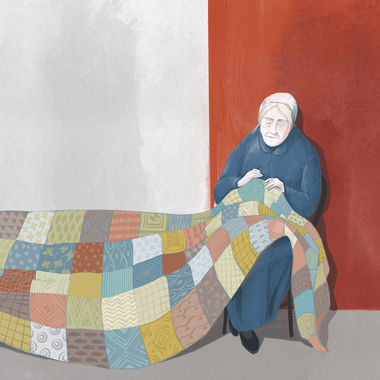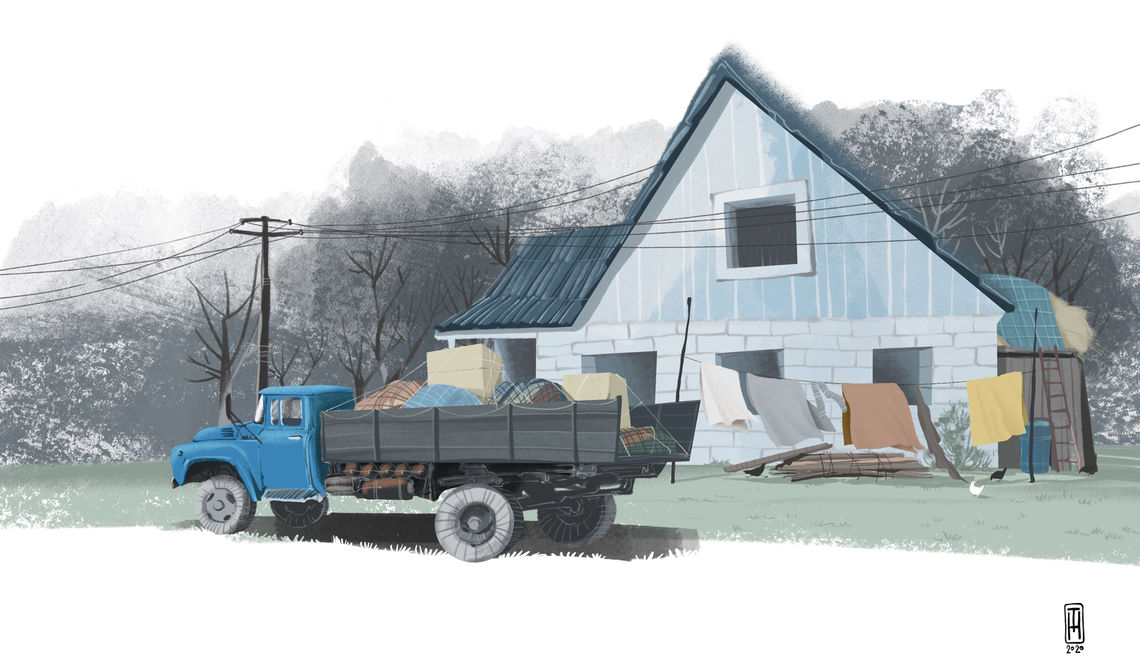
Chez moi, the French say. We don’t say it that way, but that is how we live it. We don’t use the phrase chez moi, but that is how we feel when we are at home – “with myself”. I am at home, I am with myself. The word chez is not “with” literally, but the meaning it conveys is to be “close to” someone.
We are closer to ourselves when we are at home.
The love that Armenians have for their homes is powerful.
Original illustrations by Harut Tumaghyan.
Translated by Nazareth Seferian.
հայերեն
Chez moi
A Diaspora Armenian, with a profession as advanced as his age, said the following after receiving many offers for an apartment in Yerevan – “Home can only refer to your ancestral house. In all other cases, you are simply talking about accommodation, so the details do not matter.”
And each of us creates that chez moi for someone specific, where we are very close to ourselves, we are with ourselves.
We miss home the way we miss the people that live there. When we tidy our house, we talk to it: “What is this thing doing here? How did this get so dirty? Oh dear, why is this so bent out of shape?”
Every summer, my mother would repair the roof of her father’s ancestral home, because he had not left behind a grave – he was shot in 1947. Every summer, my mother would repair the roof of her paternal grandfather’s home, even though he had not spent much time in that house.
We love our houses with the skill of a person who has lost their home.
Because a war breaks out one day and you have to leave your home. One morning, say at 7.10 am, a war breaks out and you have to leave home.
At first, you wait for the war to end, it is supposed to end in three days. The only reason for thinking this is that the previous war had ended three days after it started. But wars have different durations, we forget that sometimes.
So you leave home in order to save yourself and then return, confident that your house will still be there.
You save yourself, but not the house. Or rather, you don’t save yourself at home, but outside the house. You are unable to save your chez moi.
Wherever you live from now on, you will not be able to say it is chez moi.
Enemy soldiers are at the houses that have been left on their own. You cannot kill houses that are alone, you cannot torture them to death.
The solitary houses watch the unshaven soldiers enjoy themselves.
In one house, an unshaven soldier has opened the housewife’s cupboard and taken out and lined on the ground, one by one, jars of various sizes containing different flavors of preserves. He chooses a dark red cherry compote and a jar of pickled pepper. He clumsily kicks the others around and smashes one container with the other, with tomato paste now staining the previously pristine floor.
The unshaven soldier wipes the surface of the carefully used and wonderfully maintained Soviet table, clearing off the minor debris that had fallen on it during the war, and puts the three-liter red compote jar directly on the table. That compote used to have a special juice decanter made of Soviet crystal. Nobody had ever placed a three-liter glass jar directly on this table before.
Then the enemy soldier takes out the special plates from the cupboard and, this time, places them very carefully on the table, at equal distance from each other, probably the way his mother used to do it. He presumably does not think of his mother at that moment because, if he did, he would have hesitated before invading another woman’s cupboard. Mothers are forgotten at moments like that one, because the mothers have already done their jobs by that point – they have given birth to burly boys that disrespect others’ homes, the kind that later turn into unshaven soldiers.
Before the feast, one of the unshaven soldiers touches the grand piano with his fingers, but they are genetically incompatible with that instrument, which means that he ends up running his fist across the black and white keys of that Soviet musical instrument, carefully preserved until that day.
This is probably not a village home, it must be a house in a regional capital. The owner of the house is probably watching a video online of this audacious striptease his house is performing.
But the home watches the tragedy unfold silently. It cannot speak, so it does not. And it’s a good thing too – they would kill it if it spoke.
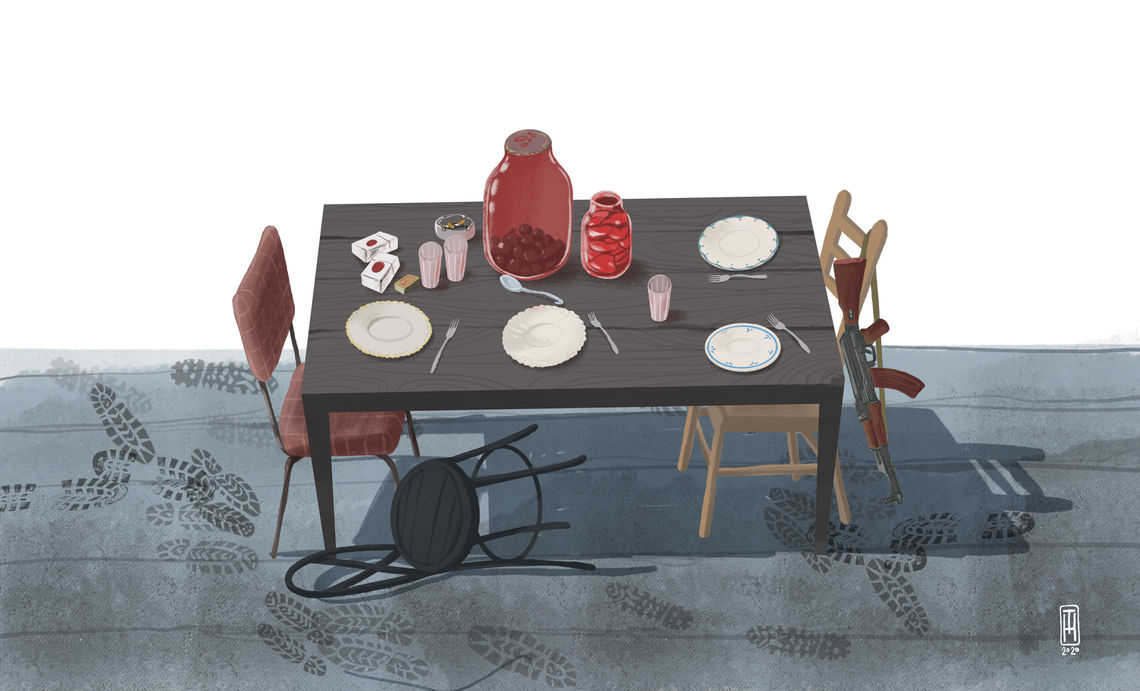
It cannot cause itself to explode, it will only explode if they blow it up. It cannot do anything on its own. But there is one thing – there is a peaceful cynicism in houses that have been left on their own, the kind that comes when someone knows something invaluably important.
They throw the washing machine out the window, followed by other household items. They use the curtain to clean their muddy military boots.
The cynicism of the house is not the cynicism of a victor. There is always something transient in the cynicism that comes with victory. And the recognition of that transience always adds an element of fear to that cynicism, no matter how much one attempts to cover it up with the arrogance of victory. There is a confident cynicism in houses that have been left on their own.
What is the secret of this serene cynicism, of this wise serenity?
Perhaps the fact that the house knows that its new masters are hardcore believers, and the house will be able to find a way every morning and every night to give them a sign that they will never find happiness in the home of another. It will always be able to find a way to inspire fear when, for example, the new master of the house forgets about the three centimeters of height difference in the living room and kitchen floors, that insignificant obstacle tripping him up and causing him to end up spread-eagled on the floor of someone else’s home which is now his. And even if nothing happens except for a negligible bruise, the fear will creep in that there can never be joy in the house of another, and he will lose his peace of mind from that day onward.
Or perhaps when the walls start to make strange noises in the rural darkness and silence of the night, emitting octaves and undulations that were familiar and understandable to the old owners, but come to the new masters as otherworldly signs and drive them to the point of delusion.
Or when one of the many compotes or preserves in the cupboard ends up containing the botulinum toxin and poisons the nervous system of the unshaven soldiers, bringing an end to their enjoyment.
Is that the secret of the serene but audacious cynicism of the house? Vengeance, on its own, without human help?
Or does the house know more about people than people themselves do, and is this the real reason for its wise and serene audacity? The walls of the village landowner’s home, the fireplace in the wall, the built-in furnace, the wall behind it, and the humid and secure room that is fully grounded in the soil beneath it all come together in a word with Farsi origins – taghband, which refers to a room with arched walls. Such a room has always protected the family from the missiles that the enemy has launched while, in peaceful times, it has preserved the food stores that had been set aside for the whole year. Do you know how much human history has been retained by these ancient walls? People perceive events within the context of the brief lives that they have spent on this planet. But the old walls of a village house know that this is yet another occasion when its masters are fighting against newcomers, and its masters may win, die, lose, leave and then return to fight again, win and live. And this goes on for a long time, continuously, and the house is an eternal witness.
But the walls always recognize their masters.
And, in contrast to the masters of that moment, the houses know that life is forever. Masters come and go, they win or lose to the non-masters, and then the same thing continues but happens from the other side, the masters and non-masters change places. But the houses are always there, always. Even if their walls collapse, and the fireplace and taghband are ruined, you cannot burn off the land. The land absorbs all these incidents, the colors of the walls, their smells, the substance of the self-made swing that hung from the tree branch, the thoughts of the child that would swing on it, the color of the Kataro wine made by the Avetisyans, its taste, the sounds of the voices in the yard… That is why people unconsciously give land so much importance. This is why the house watches with powerful cynicism and wise serenity as the unshaven soldiers enjoy themselves.
We love our houses with the skill of a person who has lost their home. But homes are not lost, they are forever waiting. Homes are always chez soi – they are with themselves. Sometimes, we are not there. We miss them, because we are transient, but homes are forever.
In cooperation with the Heinrich Boell Foundation Yerevan Office South Caucasus Region.
also read
The Summer of Chomalag
By Lusine Kharatyan
Chomalag, which means epidemic in one of the dialects of the Gegharkunik region of Armenia delves into the suspended lives of people in times of an epidemic.
The Peephole
By Karen Avetisyan
A peephole view into the kaleidoscopic distortions of other people’s lives where human interaction is set in ways foreign to you and distant from you yet in your city where the “hero” is your friend. A true, but not a real story from the ninth floor, in building 9a, in the Ninth District, the door without the peephole.
Zarmanazan
By Gevorg Ter-Gabrielyan
This is neither a true story nor a real story. But it could be either if fate ever stepped in to deliver a surprising lesson on toxic masculinity.
Homekeeping
By Armen of Armenia (Ohanyan)
"Not a True Story But a Real Story" series is a reflection on individual transformations of collective identity and the concept of home. Armen of Armenia (Ohanyan) ponders why “housecat-like Armenians” didn’t just sit tight within their four walls when they could have become “heroes” by simply staying home.
The Quilted Refuge
By Vigen Galstyan
A story weaving together the fragments of a woman’s life who organized the chaos of reality into a sensible and livable realm offhandedly called “home” but no one recognized it until she was gone.



